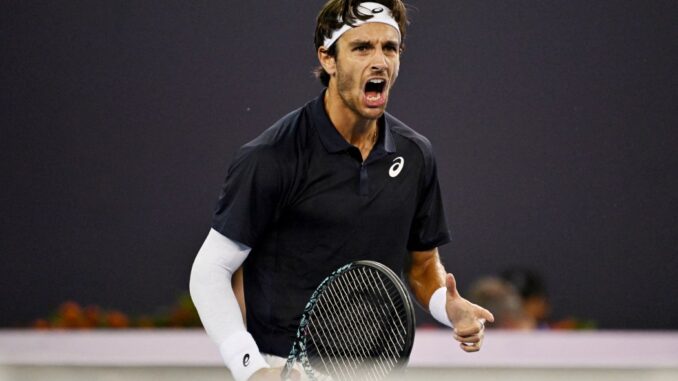
On Saturday, Italian tennis star Lorenzo Musetti publicly apologised after an outburst directed at spectators during his China Open match in Beijing. The apology came in the wake of a widely condemned comment — heard by the crowd and captured on broadcast — in which Musetti muttered in frustration, “They cough every three seconds,” and was accused by local media of referring to “those damn Chinese” during a tense moment on court.
The incident took place during Musetti’s round-of-32 match against Giovanni Mpetshi Perricard. As the match progressed, Musetti appeared increasingly agitated by coughing noises emanating from the stands. In one moment, he mimed a throat clearing gesture and muttered the now-infamous phrase in Italian. In some Chinese media outlets, it was additionally claimed that he had mouthed an expletive targeted at “the Chinese,” though Musetti later denied any intent to generalize.
Despite the controversy, Musetti won the match in three sets, advancing to the Round of 16. But the focus quickly shifted from tennis to diplomacy and public relations.
The apology:
On Saturday, Musetti addressed the incident via an Instagram post. He wrote:
“Dear Chinese fans, I would like to sincerely apologise for what I said in frustration yesterday during my match. My words were directed only at a few individuals in the crowd who were coughing repeatedly and disturbing the play. They were never, in any way, meant for the Chinese people. It happened in a moment of stress and tension in the second tiebreak, but still, this is no excuse at all.”
He went on:
“I realise that the way I expressed myself was wrong and inappropriate, and it hurt many Chinese fans’ feelings. I deeply regret it and feel very remorseful.”
Musetti also emphasised his respect for China and the Chinese people:
“I have always admired the Chinese people and I truly appreciate playing in your country. I have been coming back to China since 2018 and I always feel very welcome here. I am grateful for the incredible support I constantly receive and for the many fans I have in China. Once again, I am truly sorry. I respect you deeply, I feel at home here, and I value the warmth and kindness I have always received from you.”
He explicitly denied that his comments were meant to generalize or insult Chinese people as a whole, and framed them instead as a spur-of-the-moment response to crowd disruption.
Reactions, context & implications:
News of Musetti’s remark spread quickly on social media and in Chinese media outlets, prompting sharp criticism. Some observers accused him of racism or cultural insensitivity, while others expressed disappointment that a professional athlete would direct such frustration toward fans, especially while competing abroad.
The timing matters. In a global age of heightened awareness on social issues, athletes increasingly face scrutiny not only for their sporting performance, but for how they conduct themselves in public and how they interact with fans, media, and local culture. An outburst marked by a perceived ethnic slur or derogatory generalisation can quickly escalate into a diplomatic thorn, particularly during international events held in countries sensitive to cultural or national respect.
Already this month at the China Open, another high-profile incident drew attention: American tennis player Taylor Townsend faced backlash and issued an apology after making disparaging comments about Chinese food in a social media post. The Musetti incident thus comes amid a climate in which athletes are expected to tread carefully in navigating intercultural situations.
From a sporting view, Musetti must now carry the weight of this controversy alongside the pressures of competition. In the public eye, the outburst and apology may become inseparable from his performance in Beijing, overshadowing matches and influencing how spectators, sponsors, and fellow players perceive him.
Some will view the apology as sincere and necessary, an appropriate attempt at damage control. Others may see it as insufficient or too reactive, given that the original comment was uttered during play — potentially betraying deeper attitudes or a lack of mindfulness.
There is also the question of precedent: how should governing bodies, tournament organizers, or the ATP respond? Will stronger guidelines or penalties be enforced for unsportsmanlike conduct or offensive remarks — especially in international settings? At present, there is no indication that Musetti faces official disciplinary action, but the incident adds to a growing catalogue of sports figures whose off-court (or off-racquet) remarks draw as much attention as their on-court exploits.
Looking ahead:
As Musetti continues in the China Open, he now carries both the burden of performance and the weight of public scrutiny. Any further successes will be viewed not just through a lens of skill and strategy, but also through the prism of character, diplomacy, and cultural sensitivity.
If he can continue to play well and show respectful, thoughtful behaviour in public and in interviews, he may be able to rehabilitate his image in the eyes of those offended. But the path will not be smooth: social media conversations are quick to attach symbolic significance to such moments.
For China’s tennis fans, the apology may help soothe hurt feelings, but many will expect follow-through: not just words, but consistent respect in gesture, interaction, and attitude — not only from Musetti, but from all visiting athletes.
In the end, this incident offers a cautionary tale about the responsibilities that come with being an international sports figure. In a world that is more interconnected and socially conscious than ever, one lapse of judgment—especially during a high-pressure moment on court—can ripple far beyond the scoreline.

Leave a Reply